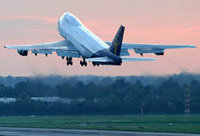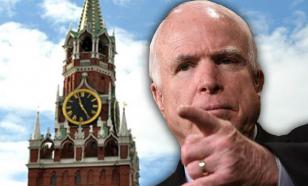Russian civil aviation to fall into oblivion with WTO
 One of the landmark events, which took place in 2011, is the completion of the talks about Russia's membership in the World Trade Organization. This event is supposed to exert serious influence on the structure of the Russian civil aviation.
One of the landmark events, which took place in 2011, is the completion of the talks about Russia's membership in the World Trade Organization. This event is supposed to exert serious influence on the structure of the Russian civil aviation.
The dispute about the change of the configuration of the home market of civil aviation started long before the protocol of Russia's joining the WTO. Some experts believe that Russia's membership in the organization is not going to change anything in the Russian civil aviation. Some others predict a total collapse of the Russian aviation industry. It is already one foot in the grave without the WTO - there is no point in pretending otherwise. During the Soviet times, nearly every forth airplane in the world was labeled "Made in the USSR." Nowadays, Russia's contribution in the world aviation industry can hardly reach two percent. The current plans of the domestic United Aircraft Corporation to build more than 20 Sukhoi SuperJet 100 planes in 2012 are perceived as a piece of sensation. The corporation has already produced 20 such planes, which is already a big achievement.
Skeptics say, though, that reducing the duties on foreign aircraft will destroy the Russian aviation industry completely. The customs duties on medium-range aircraft will be reduced indeed. However, the duties on wide-body long-range planes are going to be raised. At present moment, airlines are supposed to pay the excise of 20 percent for each medium-range aircraft.
Taking into consideration the multi-million cost of aircraft and the low profitability of this business in Russia, this measure is certainly a prohibitive one as far as the import of such aircraft is concerned. The measure will be justifiable for Russia as long as the country is capable of making such aircraft itself. When all the documents are ratified and Russia signs the adequate aviation protocol, the duty will drop to 12.5 percent, which is also enough as a prohibitive measure.
As for the long-range airlines, which Russia does not make at all, the customs tariff for them is zero. When Russia becomes a WTO member, it will make up 7.5 percent. Since there are no domestic analogues to that, the basis for this norm is not clear. This norm creates an additional burden for the airlines. It is quite possible, though, that Russia will eventually design its long-range aircraft. The project is known as "aircraft 2020."
The imminent reduction of duties will not be as fatal as certain domestic aircraft makers can imagine. The prohibition to subsidize the leasing of Russian aircraft may show a much stronger influence. Presently, the state compensates a part of the interest rate on bank loans to leasing companies. In addition, the state also reimburses airlines with a part of the cost connected with leasing payments. However, WTO rules exclude the state support for the export or import substitution. This goes for air transportations as well.
As much as 5.5 billion rubles will be spent on the purpose during the upcoming two years, which means that such support will be preserved. The support may take a different form, though. They already put forward an idea to use state bonds for the purpose. The mechanism has not been developed yet. It is thought that the banks that provide the long-term financial support for the system of leasing and sales of domestic aviation on privileged terms, will be receiving fixed state securities free of charge.
To make matters worse, foreign airlines may appear in the Russia's domestic airline industry. However, taking into consideration the low profitability of domestic air transportation, it is not likely to happen.
Serious competition may occur if foreign companies that deal with the technical servicing of airplanes come to the domestic market. The same may happen if foreign pilots come to domestic air routes. Russian pilots may not be experts when it comes to control systems of imported airplanes, which may often leads to tragedies.
The cancellation of trans-Siberian royalties is perhaps the most painful issue. Russia is the only country in the world, which charges for the flights above its territory. Foreign airlines pay Russia $400 million a year in total. All of those changes will not be a high price if the WTO membership gives more quality and security to the Russian civil aviation.
Sergei Podosenov
Bigness
Read the original in Russian
Subscribe to Pravda.Ru Telegram channel, Facebook, RSS!




